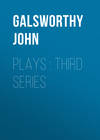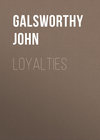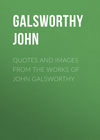Kitabı oku: «Fraternity», sayfa 6
CHAPTER IX
HILARY GIVES CHASE
The ethics of a man like Hilary were not those of the million pure bred Purceys of this life, founded on a sense of property in this world and the next; nor were they precisely the morals and religion of the aristocracy, who, though aestheticised in parts, quietly used, in bulk, their fortified position to graft on Mr. Purcey’s ethics the principle of ‘You be damned!’ In the eyes of the majority he was probably an immoral and irreligious man; but in fact his morals and religion were those of his special section of society – the cultivated classes, “the professors, the artistic pigs, advanced people, and all that sort of cuckoo,” as Mr. Purcey called them – a section of society supplemented by persons, placed beyond the realms of want, who speculated in ideas.
Had he been required to make confession of his creed he would probably have framed it in some such way as this: “I disbelieve in all Church dogmas, and do not go to church; I have no definite ideas about a future state, and do not want to have; but in a private way I try to identify myself as much as possible with what I see about me, feeling that if I could ever really be at one with the world I live in I should be happy. I think it foolish not to trust my senses and my reason; as for what my senses and my reason will not tell me, I assume that all is as it had to be, for if one could get to know the why of everything in one would be the Universe. I do not believe that chastity is a virtue in itself, but only so far as it ministers to the health and happiness of the community. I do not believe that marriage confers the rights of ownership, and I loathe all public wrangling on such matters; but I am temperamentally averse to the harming of my neighbours, if in reason it can be avoided. As to manners, I think that to repeat a bit of scandal, and circulate backbiting stories, are worse offences than the actions that gave rise to them. If I mentally condemn a person, I feel guilty of moral lapse. I hate self-assertion; I am ashamed of self-advertisement. I dislike loudness of any kind. Probably I have too much tendency to negation of all sorts. Small-talk bores me to extinction, but I will discuss a point of ethics or psychology half the night. To make capital out of a person’s weakness is repugnant to me. I want to be a decent man, but – I really can’t take myself too seriously.”
Though he had preserved his politeness towards Cecilia, he was in truth angry, and grew angrier every minute. He was angry with her, himself, and the man Hughs; and suffered from this anger as only they can who are not accustomed to the rough-and-tumble of things.
Such a retiring man as Hilary was seldom given the opportunity for an obvious display of chivalry. The tenor of his life removed him from those situations. Such chivalry as he displayed was of a negative order. And confronted suddenly with the conduct of Hughs, who, it seemed, knocked his wife about, and dogged the footsteps of a helpless girl, he took it seriously to heart.
When the little model came walking up the garden on her usual visit, he fancied her face looked scared. Quieting the growling of Miranda, who from the first had stubbornly refused to know this girl, he sat down with a book to wait for her to go away. After sitting an hour or more, turning over pages, and knowing little of their sense, he saw a man peer over his garden gate. He was there for half a minute, then lounged across the road, and stood hidden by some railings.
‘So?’ thought Hilary. ‘Shall I go out and warn the fellow to clear off, or shall I wait to see what happens when she goes away?’
He determined on the latter course. Presently she came out, walking with her peculiar gait, youthful and pretty, but too matter-of-fact, and yet, as it were, too purposeless to be a lady’s. She looked back at Hilary’s window, and turned uphill.
Hilary took his hat and stick and waited. In half a minute Hughs came out from under cover of the railings and followed. Then Hilary, too, set forth.
There is left in every man something of the primeval love of stalking. The delicate Hilary, in cooler blood, would have revolted at the notion of dogging people’s footsteps. He now experienced the holy pleasures of the chase. Certain that Hughs was really following the girl, he had but to keep him in sight and remain unseen. This was not hard for a man given to mountain-climbing, almost the only sport left to one who thought it immoral to hurt anybody but himself.
Taking advantage of shop-windows, omnibuses, passers-by, and other bits of cover, he prosecuted the chase up the steepy heights of Campden Hill. But soon a nearly fatal check occurred; for, chancing to take his eyes off Hughs, he saw the little model returning on her tracks. Ready enough in physical emergencies, Hilary sprang into a passing omnibus. He saw her stopping before the window of a picture-shop. From the expression of her face and figure, she evidently had no idea that she was being followed, but stood with a sort of slack-lipped wonder, lost in admiration of a well-known print. Hilary had often wondered who could possibly admire that picture – he now knew. It was obvious that the girl’s aesthetic sense was deeply touched.
While this was passing through his mind, he caught sight of Hughs lurking outside a public-house. The dark man’s face was sullen and dejected, and looked as if he suffered. Hilary felt a sort of pity for him.
The omnibus leaped forward, and he sat down smartly almost on a lady’s lap. This was the lap of Mrs. Tallents Smallpeace, who greeted him with a warm, quiet smile, and made a little room.
“Your sister-in-law has just been to see me, Mr. Dallison. She’s such a dear-so interested in everything. I tried to get her to come on to my meeting with me.”
Raising his hat, Hilary frowned. For once his delicacy was at fault. He said:
“Ah, yes! Excuse me!” and got out.
Mrs. Tallents Smallpeace looked after him, and then glanced round the omnibus. His conduct was very like the conduct of a man who had got in to keep an assignation with a lady, and found that lady sitting next his aunt. She was unable to see a soul who seemed to foster this view, and sat thinking that he was “rather attractive.” Suddenly her dark busy eyes lighted on the figure of the little model strolling along again.
‘Oh!’ she thought. ‘Ah! Yes, really! How very interesting!’
Hilary, to avoid meeting the girl point-blank, had turned up a by-street, and, finding a convenient corner, waited. He was puzzled. If this man were persecuting her with his attentions, why had he not gone across when she was standing at the picture-shop?
She passed across the opening of the by-street, still walking in the slack way of one who takes the pleasures of the streets. She passed from view; Hilary strained his eyes to see if Hughs were following. He waited several minutes. The man did not appear. The chase was over! And suddenly it flashed across him that Hughs had merely dogged her to see that she had no assignation with anybody. They had both been playing the same game! He flushed up in that shady little street, in which he was the only person to be seen. Cecilia was right! It was a sordid business. A man more in touch with facts than Hilary would have had some mental pigeonhole into which to put an incident like this; but, being by profession concerned mainly with ideas and thoughts, he did not quite know where he was. The habit of his mind precluded him from thinking very definitely on any subject except his literary work – precluded him especially in a matter of this sort, so inextricably entwined with that delicate, dim question, the impact of class on class.
Pondering deeply, he ascended the leafy lane that leads between high railings from Notting Hill to Kensington.
It was so far from traffic that every tree on either side was loud with the Spring songs of birds; the scent of running sap came forth shyly as the sun sank low. Strange peace, strange feeling of old Mother Earth up there above the town; wild tunes, and the quiet sight of clouds. Man in this lane might rest his troubled thoughts, and for a while trust the goodness of the Scheme that gave him birth, the beauty of each day, that laughs or broods itself into night. Some budding lilacs exhaled a scent of lemons; a sandy cat on the coping of a garden wall was basking in the setting sun.
In the centre of the lane a row of elm-trees displayed their gnarled, knotted roots. Human beings were seated there, whose matted hair clung round their tired faces. Their gaunt limbs were clothed in rags; each had a stick, and some sort of dirty bundle tied to it. They were asleep. On a bench beyond, two toothless old women sat, moving their eyes from side to side, and a crimson-faced woman was snoring. Under the next tree a Cockney youth and his girl were sitting side by side-pale young things, with loose mouths, and hollow cheeks, and restless eyes. Their arms were enlaced; they were silent. A little farther on two young men in working clothes were looking straight before them, with desperately tired faces. They, too, were silent.
On the last bench of all Hilary came on the little model, seated slackly by herself.
CHAPTER X
THE TROUSSEAU
This the first time these two had each other at large, was clearly not a comfortable event for either of them. The girl blushed, and hastily got off her seat. Hilary, who raised his hat and frowned, sat down on it.
“Don’t get up,” he said; “I want to talk to you.”
The little model obediently resumed her seat. A silence followed. She had on the old brown skirt and knitted jersey, the old blue-green tam-o’-shanter cap, and there were marks of weariness beneath her eyes.
At last Hilary remarked: “How are you getting on?”
The little model looked at her feet.
“Pretty well, thank you, Mr. Dallison.”
“I came to see you yesterday.”
She slid a look at him which might have meant nothing or meant much, so perfect its shy stolidity.
“I was out,” she said, “sitting to Miss Boyle.”
“So you have some work?”
“It’s finished now.”
“Then you’re only getting the two shillings a day from Mr. Stone?”
She nodded.
“H’m!”
The unexpected fervour of this grunt seemed to animate the little model.
“Three and sixpence for my rent, and breakfast costs threepence nearly – only bread-and-butter – that’s five and two; and washing’s always at least tenpence – that’s six; and little things last week was a shilling – even when I don’t take buses – seven; that leaves five shillings for my dinners. Mr. Stone always gives me tea. It’s my clothes worries me.” She tucked her feet farther beneath the seat, and Hilary refrained from looking down. “My hat is awful, and I do want some – ” She looked Hilary in the face for the first time. “I do wish I was rich.”
“I don’t wonder.”
The little model gritted her teeth, and, twisting at her dirty gloves, said: “Mr. Dallison, d’you know the first thing I’d buy if I was rich?”
“No.”
“I’d buy everything new on me from top to toe, and I wouldn’t ever wear any of these old things again.”
Hilary got up: “Come with me now, and buy everything new from top to toe.”
“Oh!”
Hilary had already perceived that he had made an awkward, even dangerous, proposal; short, however, of giving her money, the idea of which offended his sense of delicacy, there was no way out of it. He said brusquely: “Come along!”
The little model rose obediently. Hilary noticed that her boots were split, and this – as though he had seen someone strike a child – so moved his indignation that he felt no more qualms, but rather a sort of pleasant glow, such as will come to the most studious man when he levels a blow at the conventions.
He looked down at his companion – her eyes were lowered; he could not tell at all what she was thinking of.
“This is what I was going to speak to you about,” he said: “I don’t like that house you’re in; I think you ought to be somewhere else. What do you say?”
“Yes, Mr. Dallison.”
“You’d better make a change, I think; you could find another room, couldn’t you?”
The little model answered as before: “Yes, Mr. Dallison.”
“I’m afraid that Hughs is-a dangerous sort of fellow.”
“He’s a funny man.”
“Does he annoy you?”
Her expression baffled Hilary; there seemed a sort of slow enjoyment in it. She looked up knowingly.
“I don’t mind him – he won’t hurt me. Mr. Dallison, do you think blue or green?”
Hilary answered shortly: “Bluey-green.”
She clasped her hands, changed her feet with a hop, and went on walking as before.
“Listen to me,” said Hilary; “has Mrs. Hughs been talking to you about her husband?”
The little model smiled again.
“She goes on,” she said.
Hilary bit his lips.
“Mr. Dallison, please – about my hat?”
“What about your hat?”
“Would you like me to get a large one or a small one?”
“For God’s sake,” answered Hilary, “a small one – no feathers.”
“Oh!”
“Can you attend to me a minute? Have either Hughs or Mrs. Hughs spoken to you about – coming to my house, about – me?”
The little model’s face remained impassive, but by the movement of her fingers Hilary saw that she was attending now.
“I don’t care what they say.”
Hilary looked away; an angry flush slowly mounted in his face.
With surprising suddenness the little model said:
“Of course, if I was a lady, I might mind!”
“Don’t talk like that!” said Hilary; “every woman is a lady.”
The stolidity of the girl’s face, more mocking far than any smile, warned him of the cheapness of this verbiage.
“If I was a lady,” she repeated simply, “I shouldn’t be livin’ there, should I?”
“No,” said Hilary; “and you had better not go on living there, anyway.”
The little model making no answer, Hilary did not quite know what to say. It was becoming apparent to him that she viewed the situation with a very different outlook from himself, and that he did not understand that outlook.
He felt thoroughly at sea, conscious that this girl’s life contained a thousand things he did not know, a thousand points of view he did not share.
Their two figures attracted some attention in the crowded street, for Hilary-tall and slight, with his thin, bearded face and soft felt hat – was what is known as “a distinguished-looking man”; and the little model, though not “distinguished-looking” in her old brown skirt and tam-o’shanter cap, had the sort of face which made men and even women turn to look at her. To men she was a little bit of strangely interesting, not too usual, flesh and blood; to women, she was that which made men turn to look at her. Yet now and again there would rise in some passer-by a feeling more impersonal, as though the God of Pity had shaken wings overhead, and dropped a tiny feather.
So walking, and exciting vague interest, they reached the first of the hundred doors of Messrs. Rose and Thorn.
Hilary had determined on this end door, for, as the adventure grew warmer, he was more alive to its dangers. To take this child into the very shop frequented by his wife and friends seemed a little mad; but that same reason which caused them to frequent it – the fact that there was no other shop of the sort half so handy – was the reason which caused Hilary to go there now. He had acted on impulse; he knew that if he let his impulse cool he would not act at all. The bold course was the wise one; this was why he chose the end door round the corner. Standing aside for her to go in first, he noticed the girl’s brightened eyes and cheeks; she had never looked so pretty. He glanced hastily round; the department was barren for their purposes, filled entirely with pyjamas. He felt a touch on his arm. The little model, rather pink, was looking up at him.
“Mr. Dallison, am I to get more than one set of – underthings?”
“Three-three,” muttered Hilary; and suddenly he saw that they were on the threshold of that sanctuary. “Buy them,” he said, “and bring me the bill.”
He waited close beside a man with a pink face, a moustache, and an almost perfect figure, who was standing very still, dressed from head to foot in blue-and-white stripes. He seemed the apotheosis of what a man should be, his face composed in a deathless simper: “Long, long have been the struggles of man, but civilization has produced me at last. Further than this it cannot go. Nothing shall make me continue my line. In me the end is reached. See my back: ‘The Amateur. This perfect style, 8s. 11d. Great reduction.'”
He would not talk to Hilary, and the latter was compelled to watch the shopmen. It was but half an hour to closing time; the youths were moving languidly, bickering a little, in the absence of their customers – like flies on a pane unable to get out into the sun. Two of them came and asked him what they might serve him with; they were so refined and pleasant that Hilary was on the point of buying what he did not want. The reappearance of the little model saved him.
“It’s thirty shillings; five and eleven was the cheapest, and stockings, and I bought some sta – ”
Hilary produced the money hastily.
“This is a very dear shop,” she said.
When she had paid the bill, and Hilary had taken from her a large brown-paper parcel, they journeyed on together. He had armoured his face now in a slightly startled quizzicality, as though, himself detached, he were watching the adventure from a distance.
On the central velvet seat of the boot and shoe department, a lady, with an egret in her hat, was stretching out a slim silk-stockinged foot, waiting for a boot. She looked with negligent amusement at this common little girl and her singular companion. This look of hers seemed to affect the women serving, for none came near the little model. Hilary saw them eyeing her boots, and, suddenly forgetting his role of looker-on, he became very angry. Taking out his watch, he went up to the eldest woman.
“If somebody,” he said, “does not attend this young lady within a minute, I shall make a personal complaint to Mr. Thorn.”
The hand of the watch, however, had not completed its round before a woman was at the little model’s side. Hilary saw her taking off her boot, and by a sudden impulse he placed himself between her and the lady. In doing this, he so far forgot his delicacy as to fix his eyes on the little model’s foot. The sense of physical discomfort which first attacked him became a sort of aching in his heart. That brown, dingy stocking was darned till no stocking, only darning, and one toe and two little white bits of foot were seen, where the threads refused to hold together any longer.
The little model wagged the toe uneasily – she had hoped, no doubt, that it would not protrude, then concealed it with her skirt. Hilary moved hastily away; when he looked again, it was not at her, but at the lady.
Her face had changed; it was no longer amused and negligent, but stamped with an expression of offence. ‘Intolerable,’ it seemed to say, ‘to bring a girl like that into a shop like this! I shall never come here again!’ The expression was but the outward sign of that inner physical discomfort Hilary himself had felt when he first saw the little model’s stocking. This naturally did not serve to lessen his anger, especially as he saw her animus mechanically reproduced on the faces of the serving women.
He went back to the little model, and sat down by her side.
“Does it fit? You’d better walk in it and see.”
The little model walked.
“It squeezes me,” she said.
“Try another, then,” said Hilary.
The lady rose, stood for a second with her eyebrows raised and her nostrils slightly distended, then went away, and left a peculiarly pleasant scent of violets behind.
The second pair of boots not “squeezing” her, the little model was soon ready to go down. She had all her trousseau now, except the dress – selected and, indeed, paid for, but which, as she told Hilary, she was coming back to try on tomorrow, when – when – . She had obviously meant to say when she was all new underneath. She was laden with one large and two small parcels, and in her eyes there was a holy look.
Outside the shop she gazed up in his face.
“Well, you are happy now?” asked Hilary.
Between the short black lashes were seen two very bright, wet shining eyes; her parted lips began to quiver.
“Good-night, then,” he said abruptly, and walked away.
But looking round, he saw her still standing there, half buried in parcels, gazing after him. Raising his hat, he turned into the High Street towards home…
The old man, known to that low class of fellow with whom he was now condemned to associate as “Westminister,” was taking a whiff or two out of his old clay pipe, and trying to forget his feet. He saw Hilary coming, and carefully extended a copy of the last edition.
“Good-evenin’, sir! Quite seasonable to-day for the time of year! Ho, yes! ‘Westminister!'”
His eyes followed Hilary’s retreat. He thought:
“Oh dear! He’s a-given me an ‘arf-a-crown. He does look well – I like to see ‘im look as well as that – quite young! Oh dear!”
The sun-that smoky, faring ball, which in its time had seen so many last editions of the Westminster Gazette – was dropping down to pass the night in Shepherd’s Bush. It made the old butler’s eyelids blink when he turned to see if the coin really was a half-crown, or too good to be true.
And all the spires and house-roofs, and the spaces up above and underneath them, glittered and swam, and men and horses looked as if they had been powdered with golden dust.










